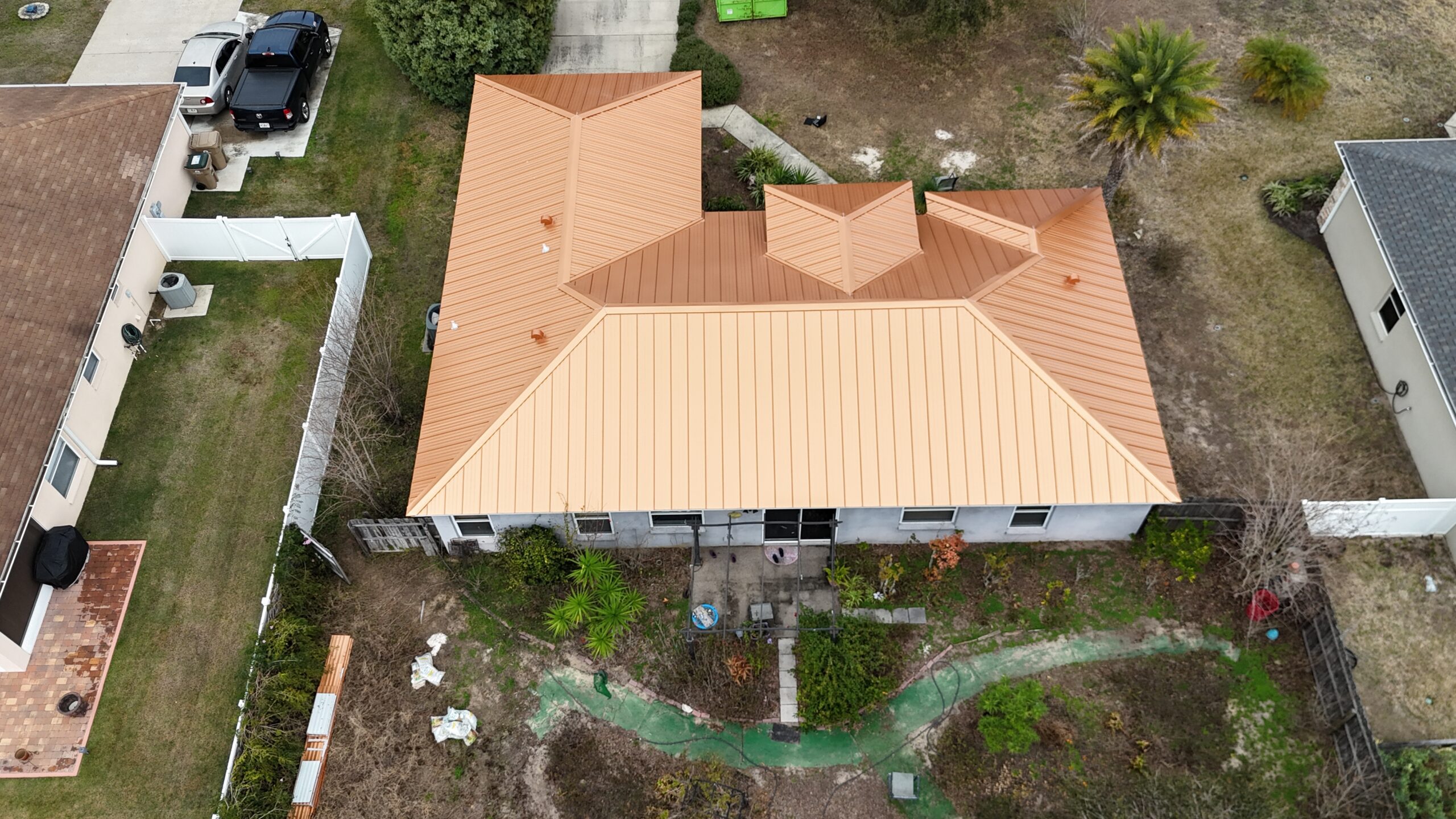How Salt Air Affects Roofs in Coastal Florida Towns. Living in a coastal Florida town comes with stunning ocean views, refreshing sea breezes, and a laid-back lifestyle. However, homeowners in coastal areas also face unique challenges when it comes to roof durability and maintenance. One of the biggest threats? Salt air. The salty, humid air along Florida’s coastline can cause significant damage to roofing materials over time, leading to corrosion, deterioration, and costly repairs if not properly managed.

How Salt Air Affects Roofs in Coastal Florida Towns
At Mock3 Performance Roofing, we specialize in coastal roofing solutions that withstand the harsh seaside environment. Let’s explore how salt air affects roofs and what you can do to protect your home.
1. Corrosion: The Biggest Threat to Coastal Roofs
Salt air carries high levels of sodium chloride, which can accelerate the corrosion process on roofing materials—especially metal components like fasteners, flashing, and support structures. Over time, salt exposure can weaken the roof, making it more vulnerable to leaks and structural damage.
Materials Most Susceptible to Corrosion:
- Galvanized steel: Prone to rusting if not properly coated
- Unprotected metal fasteners and flashing
- Aluminum roofing with insufficient protective coatings
How to Prevent Corrosion:
✔ Opt for corrosion-resistant roofing materials (e.g., aluminum, stainless steel, copper)
✔ Apply protective coatings to metal surfaces
✔ Schedule regular roof inspections to catch early signs of rust and wear
2. Moisture Damage & Accelerated Deterioration
The high humidity in coastal Florida towns means that moisture constantly interacts with your roof, leading to faster wear and tear. The combination of salt and moisture can degrade materials like asphalt shingles, wood shakes, and even tile roofing over time.
Signs of Moisture Damage from Salt Air:
- Warping or curling shingles
- Wood rot in support structures
- Cracks in clay or concrete tiles
- Water stains or leaks inside the home
How to Prevent Moisture Damage:
✔ Ensure proper attic ventilation to reduce trapped moisture
✔ Choose moisture-resistant roofing materials
✔ Regularly clean your roof to remove salt buildup
3. Moss, Algae & Mold Growth
Salt air and humidity create ideal conditions for moss, algae, and mold growth, particularly on shaded areas of the roof. These organisms trap moisture, which can lead to premature deterioration and weaken the structural integrity of your roof.
How to Combat Roof Growth:
✔ Install algae-resistant shingles (such as those with copper or zinc coatings)
✔ Use a biannual roof cleaning schedule to remove salt and organic buildup
✔ Improve sun exposure and airflow by trimming overhanging trees
4. Wind & Storm Damage
Coastal homes experience stronger winds and harsher storms than inland properties. Combined with salt air exposure, roofs that are already weakened by corrosion or moisture damage become more vulnerable to wind-driven rain, flying debris, and uplift forces.
Best Roofing Choices for Wind Resistance:
✔ Metal roofing – Highly wind-resistant and does not absorb moisture
✔ Clay or concrete tiles – Excellent durability against salt air but require strong fasteners
✔ Impact-resistant shingles – Designed to withstand high winds and flying debris
Pro Tip: Ensure your roofing system is installed with hurricane-rated fasteners and sealants for extra protection.
5. Best Roofing Materials for Coastal Florida Homes
If you live in a salt-air environment, selecting the right roofing material is crucial for long-term performance.

6. Essential Maintenance Tips for Coastal Roofs
Protecting your roof from salt air doesn’t have to be difficult, but it does require regular maintenance.
✔ Rinse Your Roof Regularly: Salt deposits can accelerate wear, so rinse your roof with fresh water (especially after storms).
✔ Schedule Annual Inspections: Have a professional roofing contractor check for early signs of corrosion or damage.
✔ Clean Your Gutters: Salt buildup and debris can clog gutters, leading to water damage.
✔ Use Anti-Corrosion Coatings: If your roof has metal components, apply protective coatings to extend its lifespan.
✔ Replace Fasteners & Flashing as Needed: Metal components are the first to corrode—swap them out before they fail.
7. Why Work With a Coastal Roofing Expert?
Not all roofing contractors understand the unique challenges of salt air damage. At Mock3 Performance Roofing, we specialize in coastal roofing solutions designed to withstand Florida’s toughest conditions.
Why Choose Us?
✔ Expertise in Salt-Air Roofing Solutions
✔ High-Quality, Storm-Resistant Materials
✔ Energy-Efficient & Corrosion-Resistant Roofing Options
✔ Professional Inspections & Long-Term Maintenance Plans
Whether you need a new coastal roof installation, repairs, or routine maintenance, our team is here to ensure your home stays protected for years to come.
Final Thoughts: Protect Your Roof from Salt Air Damage
Salt air is one of the biggest threats to coastal Florida roofs, but with the right materials, maintenance, and expert installation, your roof can withstand the elements and last for decades. Choosing corrosion-resistant roofing, staying on top of regular maintenance, and working with a trusted Florida roofing expert will ensure that your home remains protected, beautiful, and energy-efficient.
If you’re a coastal homeowner looking to upgrade, maintain, or replace your roof, contact Mock3 Performance Roofing today for a free consultation!
South Florida Division
772-267-2479
North Florida Division
352-210-3862
Tags: Roofs in Coastal Florida
